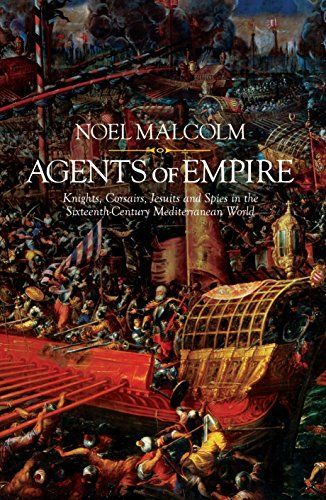
Agents of Empire Knights, Corsairs, Jesuits and Spies in the Late Sixteenth-Century Mediterranean World
In the second half of the sixteenth century, most of the Christian states of Western Europe were on the defensive against a Muslim superpower - the Empire of the Ottoman sultans. There was violent conflict, from raiding and corsairing to large-scale warfare, but there were also many forms of peaceful interaction across the surprisingly porous frontiers of these opposing power-blocs. Agents of Empiredescribes the paths taken through the eastern Mediterranean and its European hinterland by members of a Venetian-Albanian family, almost all of them previously invisible to history. They include an archbishop in the Balkans, the captain of the papal flagship at the battle of Lepanto, the power behind the throne in the Ottoman province of Moldavia, and a dragoman (interpreter) at the Venetian embassy in Istanbul. Through the life-stories of these adventurous individuals over three generations, Noel Malcolm casts the world between Venice, Rome and the Ottoman Empire in a fresh light, illuminating subjects as diverse as espionage, diplomacy, the grain trade, slave-ransoming and anti-Ottoman rebellion. He describes the conflicting strategies of the Christian powers, and the extraordinarily ambitious plans of the sultans and their viziers. Few works since Fernand Braudel's classic account of the sixteenth-century Mediterranean, published more than sixty years ago, have ranged so widely through this vital period of Mediterranean and European history. A masterpiece of scholarship as well as story-telling, Agents of Empirebuilds up a panoramic picture, both of Western power-politics and of the interrelations between the Christian and Ottoman worlds. This is a remarkable book - remarkable for its erudition, its range, and its readability. It depicts in vivid detail a world in which frontiers are porous and shifting, and in which merchants, soldiers, corsairs and the local agents of empire seize the opportunities for riches and advancement offered by more or less permanently unsettled conditions. It is a world, too, that pullulates with spies and informants eager to sell the latest information or misinformation to their paymasters in imperial and national capitals, in papal Rome, and in city-states, all of them desperate for up-to-date news of the activities of their rivals and enemies. For all the detail, Noel Malcolm never forgets the wider picture and we are constantly given fresh insights, not only into well-known episodes such as the Battle of Lepanto, but also into the overarching story of western relations with the Ottoman empire. In my view the book is a masterpiece, which will open the eyes of readers to the intrinsic interest and importance of a historically neglected region of Europe within the framework of a relationship between civilizations which is as complex today as it was in the sixteenth century.' Sir John Elliott, Regius Professor of History Emeritus, University of Oxford